Q(uar) & A is a series of interviews with some of our favorite storytellers and creators about how they’re living while in lockdown.
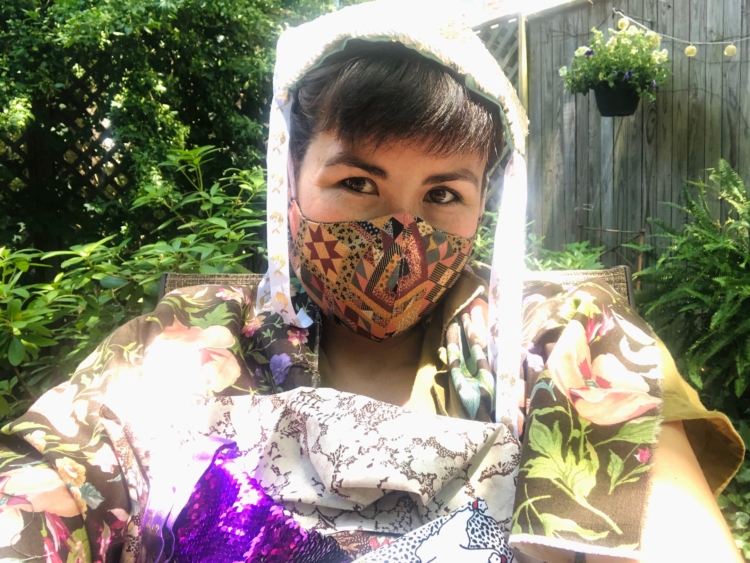
Rosa Tu is a New York-based screenwriter, singer-songwriter, and member of the Berlin-based artist collective/label The Famous Gold Watch. Her latest work is a setting of Dylan Thomas’s 1946 poem “Do not go gentle into that good night” over recent footage of anti-police violence protests in NYC (watch on YouTube).
Her album Drink All The Wine, with themes of celebration and longing, and beautiful cover art by Gracey Zhang, comes out on all streaming platforms September 18.
Where are you currently sheltering in place, and who with?
I’m sheltering with my dog, partner, and occasionally my sister in the attic apartment of my childhood home in Massachusetts.
What does your face mask look like?
I have several sparkly ones that friends and I sewed for a competition. But those are for parties. And there are no parties anymore. The one I wear every day was made by my friend Ashley. It’s reversible with blue cloth on one side, and patterned shades of brown on the other. It has a filter pocket, nose wire, and long straps made from a dusty pink T-shirt with beads on the end.
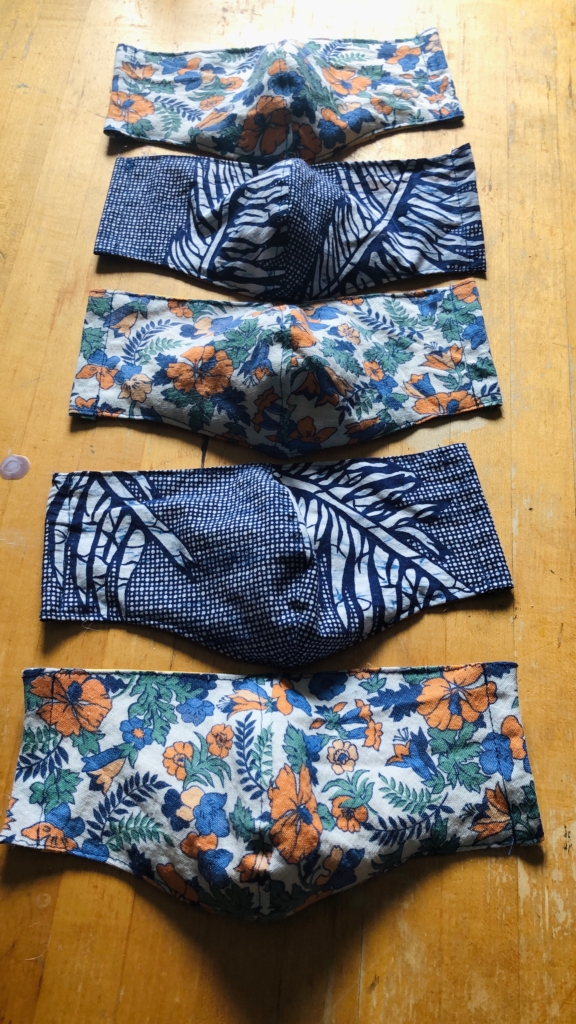
Do you follow any kind of routine at this moment?
Every Friday my friend Sophie and I bike 40 miles round-trip to a local pond to swim and eat a bagel. We’ve also started to do daily pushups, adding one per day in order to hopefully make it to 60 by August. I hope to get back into a writing routine, but have been finding it hard to get into the state of mind where writing flows easily.
What are some pieces of entertainment that you have consumed and loved during this time?
Aldous Huxley’s The Doors of Perception was an interesting read, as was Race Matters by Cornel West, and Judith Ortiz Cofer’s Silent Dancing was delightful. I’ve also been spending an unusual amount of time on Instagram staring at sociopolitical memes, hedgehogs, and tiny pigs. I kind of enjoy it, but the practice is probably closer to an addiction than a conscious “consumption of entertainment.”
Are you working on anything during this time? And if you’re having trouble “creating” things at the moment, how are you getting around it?
I am writing many songs, most of which will never be heard, and preparing to release an album, Drink All The Wine, later this summer.

I’m also, as many people are, curating my own personal history class on race/ethnicity, and the justice system in the U.S. This research helps me feel useful in certain discussions, and is nudging me in the direction of certain thoughts and opinions on identity, humanity, and meaningful work.
When I have trouble “creating,” spending time underwater is really helpful. It gives a delightful silence and a womb-like environment that tends to calm my thoughts and feelings and make me a more receptive host to passing inspirations.
Have you taken up any new hobbies?
In March, I came into possession of a sewing machine. At first, when masks were scarce, I began cutting up clothing and sewing them for friends and family. Then I joined some other women in an informal sewing-circle that donates to hospitals and other orgs in NY. Now sewing has become like singing or swimming in its capacity to calm me. I am in various stages of completion for dozens of different-sized masks, a wrap-dress, and a bathing suit.

What’s the best meal you’ve eaten so far during quar? What’s the worst?
My sister Marianna made a pressure cooker lamb and lentil stew that was out-of-control delicious. It was still cold out, and we were feeling very scared and unclear about what was to come. In this state, the warm stew was revitalizing.
A few weeks later, our fearless chef Marianna made a mashed potato dish with spoiled milk that gave everyone diarrhea. Lesson: If you can’t tell whether it’s gone bad or not, it probably has.
What’s your current iPhone wallpaper and what’s the story behind it?
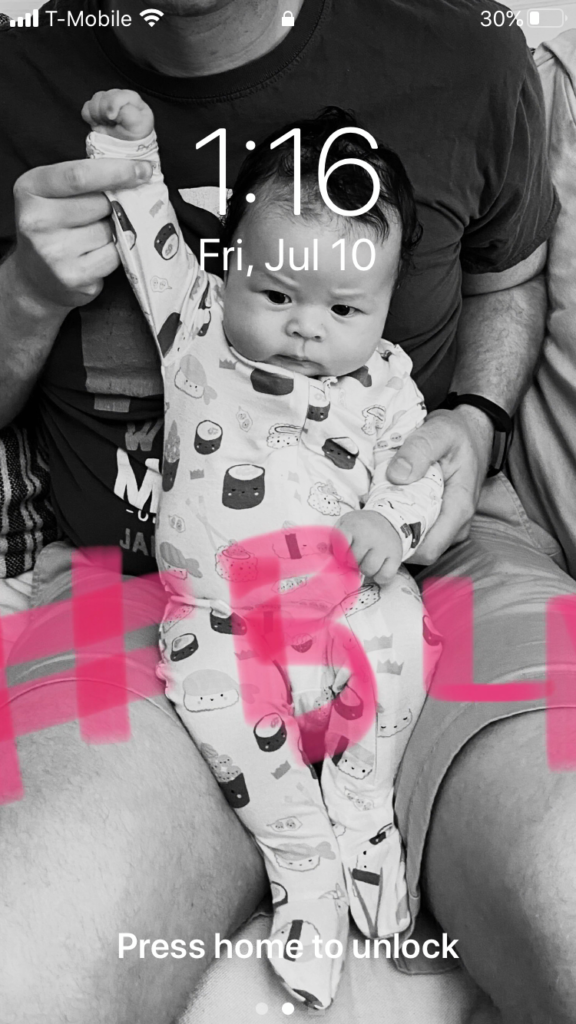
My godsister gave birth at the beginning of quarantine and this is her little baby. I found something really sweet and hopeful about it, the little sushi onesie, the expression, the fist in the air. Like, maybe if the movement stays united, this kid could grow up in a country where everyone feels a deeper sense of safety and belonging, and people are less judgmental of their own and others’ identities.
What’s the best quar purchase you’ve made so far?
Probably this hat. It looks really stupid, and makes me laugh.
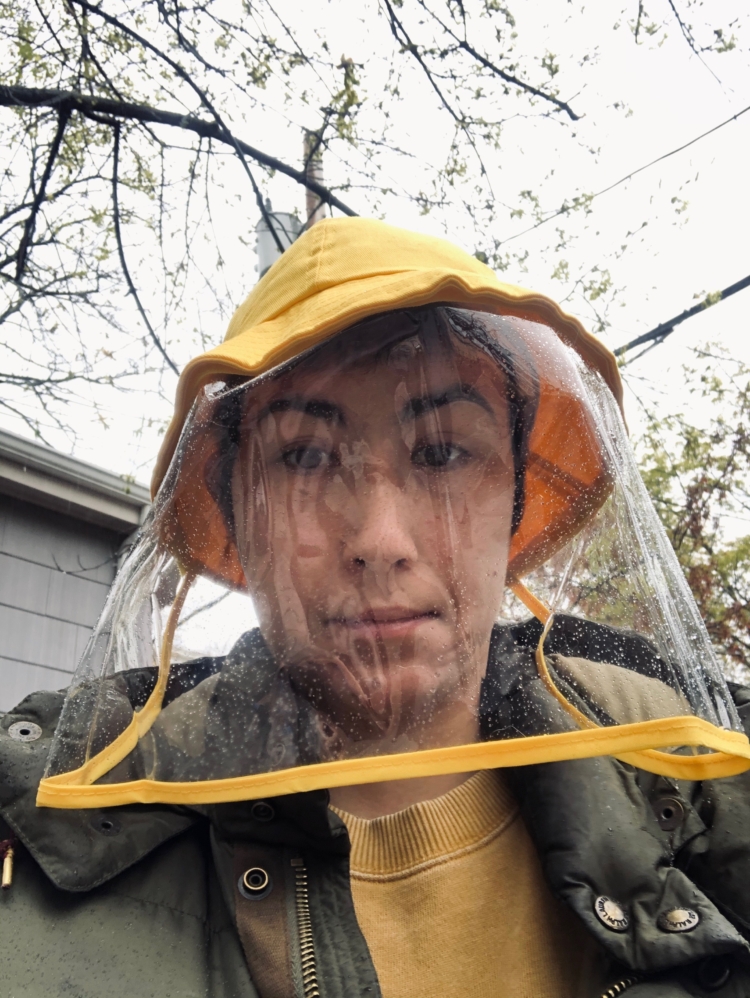
Who are the writers, storytellers, or makers who are bringing you great joy right now?
Judith Ortiz Cofer, both her poetry and prose are swirling around in my head constantly this past week. I really enjoy the imagery, the scenes of Puerto Rico and New Jersey, and how she incorporates history and folklore into her stories of life and family. Specifically, the line that is staying with me is, “your days were stacked/like clean shirts in a drawer,” [from her poem “Progress Report for a Dead Father”]. I think about it every time I open my drawer.
Do you have a favorite photo you’ve taken since lockdown?
I like this one of my dog Tito in a fort I built for him. Think it exemplifies what was going on in my life during March, a kind of return to childhood, a timeless imaginary world inside my room.
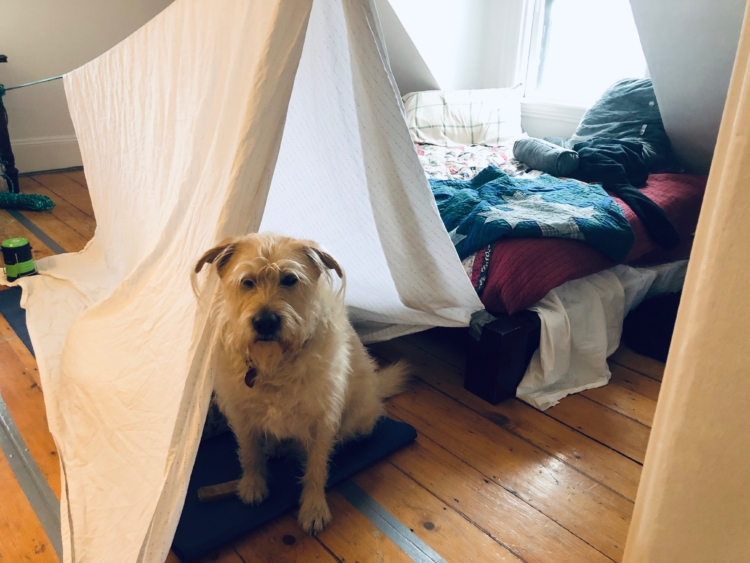
Any unexpectedly memorable moments so far?
The weekend after George Floyd was killed, Sophie and I biked to a protest in Boston. Everything felt surreal; we had been isolated from people for so long, weren’t sure how serious others were about masks and distancing, and though the organizers were clear that the protest was intended to be peaceful, we had no idea what the atmosphere would be.
When we arrived at the march, we couldn’t believe our eyes. There were THOUSANDS of people streaming down the street, chanting, yelling, holding beautiful signs. Everyone was loud, passionate, joyous, there was so much energy, it was overwhelming. We decided we’d wait until it looked like there was space to walk while distancing, but after 20 minutes the flow of people was still strong. We ended up joining the very end, biking alongside slow-moving cars who were offering water and encouragement to protesters.
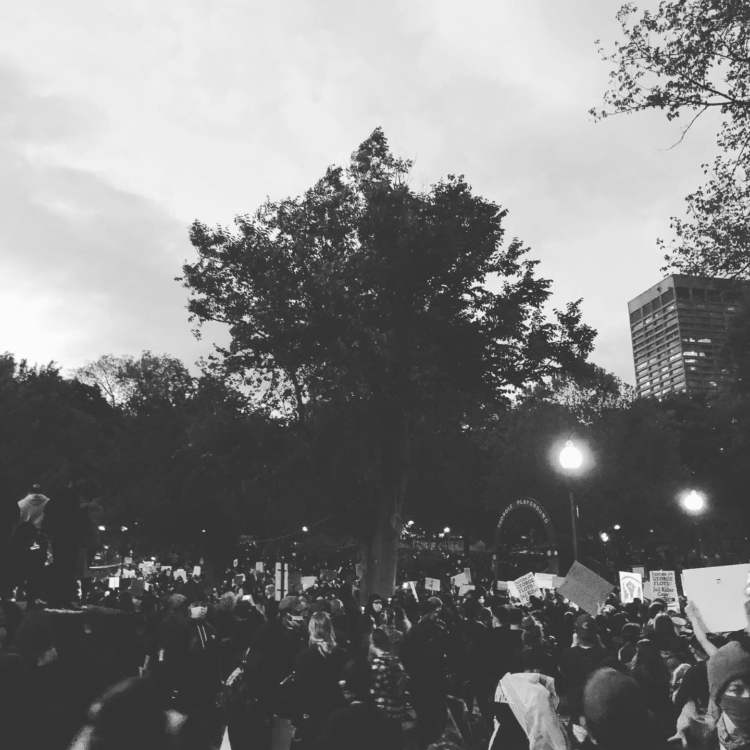
A few days later, at another protest in Franklin Park, three police vehicles tried to drive in the opposite direction of the march. As they moved forward, most people scattered, including myself, but a woman who had been marching alongside me refused to step aside for the police. Then I saw that a man had lain down right in front of the car. Dozens of people with their hands up moved in to make a wall with their bodies. They surrounded the police cars, and others surrounded them, camera-phones out.
Tensions rose quickly; the were police honking, the protesters in front were screaming with their hands up, while I was remembering the violent mess of news clips that were playing and replaying at that time, specifically a cop car in NYC moving fast into a throng of protesters. I was thinking, Oh god, oh god, please don’t let this happen.
Then someone started shouting: Back up! Back up! Let them back up! Others joined in and several people cleared a path behind the police cars so they were able to reverse. When they began their retreat, the crowd went nuts. We were all screaming and cheering and running after the rapidly reversing cars, so proud of this tiny victory. It felt so new to me, the collective power of so many ordinary people organized, making dents in the huge fortress of the justice system.
I’d felt like, up until then, a lot of us had the sense that, while broken, the system is just so massive and entrenched in the foundation of our country that nothing we could do would matter. It didn’t even occur to us to hope for change. Now I feel differently.
You can find Rosa on Facebook and Instagram @semperosa. Listen to her music on Bandcamp and Spotify.